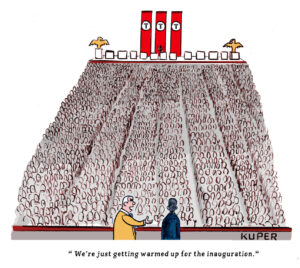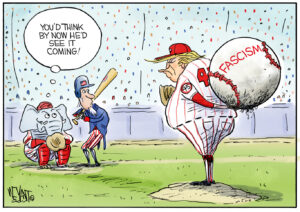Trump’s Racist Language of Pollution Drives His Brand of Fascism
The viciousness of the Trump administration and the cruelty imposed by neoliberalism mutually inform each other. AP
AP
Editor’s note: This article was originally published on Truthout.
The ruthless ideologies and policies of a fascist past are with us once again, and the warning signs can be seen in the emergence of the normalizing discourses of pollution and disposability. As a central element of neoliberalism, the discourse of disposability signals a society in which certain people are viewed as throwaways. Meanwhile the discourse of pollution suggests a mode of dehumanization that enables policies in which people are relegated outside the boundaries of justice and become the driving force for policies of terminal exclusion. These terms represent a merging of neoliberalism and fascist politics.
The utopian visions that support the promise of a radical democracy and prevent the dystopian nightmare of a fascist politics are disappearing in the United States. The viciousness of the Trump administration and the cruelty imposed by neoliberalism mutually inform each other. President Donald Trump’s policies range from stripping food stamps and health care from poor children and caging immigrant children in some god-forsaken prison in Texas to allowing thousands of Puerto Ricans to live for more than a year without electricity, safe water and decent shelter. Such policies are matched by an ongoing, if not relentless, discourse of dehumanization and objectification aimed at those considered disposable.
The deep grammar of violence now shapes all aspects of cultural production and becomes visceral in its ongoing production of domestic terrorism, mass shootings, the mass incarceration of people of color and the war on undocumented immigrants. Not only has it become more gratuitous, random and in some cases trivialized through the monotony of repetition, it also has become the official doctrine of the Trump administration in shaping its domestic and security policies. Trump’s violence has become both promiscuous in its reach and emboldening in its nod to right-wing extremist groups. The mix of white nationalism and expansion of policies that benefit the rich, big corporations and the financial elite are increasingly legitimated and normalized in a new political formation that I have called neoliberal fascism. This new historical conjuncture emerges through a fusion of discredited eugenicist discourses (e.g., Trump’s notion that you have to be born with the right genes) and a rebooted melange of mythic notions of meritocracy (objective measures of individual quality), scientific racism (pseudo-science that supports racial hierarchies), Horatio Alger fables (anyone can work hard and become rich and successful), and a sheer contempt for the “losers” who are viewed as alien to a white public sphere supported by Trump and his minions.
The dual logics of pollution and disposability have become central to a punishing state that both legitimates the denigration of human life and too often unleashes state violence upon immigrants, people of color, poor people, and anyone else considered a threat to the belief that the public sphere is exclusively for whites. Under the Trump administration, the discourse of pollution is increasingly visible when applied to undocumented immigrants or those marginalized by ethnicity and race, who those in power place in the same categories as contaminants and toxins. At the same time, those individuals considered disposable often meet a more violent end. This is clearly visible in the ongoing criminalization of immigrant children on the southern border who are forcibly separated from their parents and deposited in child migrant detention centers largely run by for-profit businesses that are making close to a billion dollars in profits. Some children have died while in these internment centers. The logic of disposability also fuels throughout the United States the modeling of public schools after armed camps, and the targeting of poor Black and Brown youth as objects of control and harassment by the criminal justice system, particularly through the expansion of the school-to-prison pipeline.
Obsessed with race, Donald Trump has weaponized and racialized the culture wars by using racially charged language to legitimate white supremacist ideologies and pit his supporters against protesting Black athletes, undocumented Latino immigrants, dark-skinned immigrants, and other people of color whom he routinely insults and punishes through race-based policies. Trump has claimed that “laziness is a trait in blacks,” according to one of his former employees, and he has called for “a total and complete shutdown of Muslims entering the United States.” Meanwhile, he stated in December 2015 that a judge hearing a case about Trump University was “biased” because of the judge’s Mexican heritage.” These comments are a small sampling of Trump’s racist remarks.
Racism runs deep not only in Trump’s base but also in a Republican Party that as Paul Krugman points out engages in extreme gerrymandering, voter suppression, voter purges, “deliberate restriction of minority access to the polls” and the ongoing subversion of state legislatures. Frank Rich has gone further and argued, “The Republican Party has proudly and uninhibitedly come out of the closet as the standard-bearer for white supremacy in the Trump era.” George Packer adds to this signaling the emerging fascist politics that now engulfs the Republican Party. He argues that simply smug ideological fundamentalists and political purists such as Barry Goldwater, Phyllis Schlafly, Ronald Reagan and Newt Gingrich no longer define the Republican Party. He writes that the GOP has become “more grotesque than ever”:
… conspiracy thinking; racism and other types of hostility toward entire groups; innuendos and incidents of violence. The new leader is like his authoritarian counterparts abroad: illiberal, demagogic, hostile to institutional checks, demanding and receiving complete acquiescence from the party, and enmeshed in the financial corruption that is integral to the political corruption of these regimes.
What we are witnessing at the current moment is not only the emergence of dangerous, illiberal, anti-democratic ideologies that mimic the legacy of white nationalism but also the resurgence of a powerful affective and educational culture nurtured by false promises, anger, feelings of repulsion, hatred and the spectacularization of violence. What is alarming about this culture of intolerance, bigotry and violence is its alignment with the Nazi obsession with notions of cultural and biological pollution and their systemic efforts to purge society of those deemed contaminated. This language is not unlike Trump’s characterization of asylum seekers as vermin who will bring “large-scale crime and disease” to the United States.
Unmasking Language of Disposability and Pollution
Rather than being a historical relic of a horrible past, the language of pollution and disposability has reemerged under the Trump administration to an unusual extent. This is a language rooted in what Thomas Mann once called “the archaic shudder,” one that opens the door to the rhetoric of racial purity, social cleansing and the glorification of violence. This merging of white nationalism and policies aimed at racial cleansing are buttressed by the cruel architecture of neoliberalism, which creates landscapes of unabashed misery, violence and terror. Neoliberalism offers little hope for economic and social justice while claiming ironically that it is not only a moral beacon and force for the good but also perniciously that there is no realistic alternative to it.
This toxic ideology is further solidified in the assumption that the connective social bonds that make a democracy possible should be viewed with disdain and replaced with a notion of individualism in which all problems and the means to address them should be placed solely at the feet of individuals. Under such circumstances, fear and economic anxiety produced by massive inequality, the dismantling of the welfare state, precarious employment, eroding white privilege, demographic changes and the collapse of the social contract are redirected to those human beings considered “losers,” “outsiders” and “excess.”
The merging of neoliberalism and elements of a fascist playbook are now anchored firmly in the language of disposability and pollution. This rhetoric is part of a representational crisis marked by the increasing attraction of and growth of architectures of meaning and proliferating digital platforms and cultural apparatuses engaged in the production of modes of desire, identifications and values that fuel right-wing extremists and an apocalyptic populism. The current historical conjuncture is marked by a new era of politics and way of thinking about place, community, rootlessness and identity. The once dominant narratives about critical agency, truth, justice and democracy are collapsing. Fascist terror is no longer fixed in the past or ephemeral to the 21st century. Under the Trump administration, malice, lies and unrelenting cruelty have become official policy and fraught with dangerous risks. Fascist politics avoids reason, maligns the truth and appeals to a pathological nationalism. In doing so it creates a mythic past that either denigrates or excludes those considered at odds with its notions of white supremacy and racial purity. What emerges is a celebration of the brutality of 1930s, which becomes a signpost for imagining a present under what Trump’s nostalgically codes in the slogans “America First” and “Make America Great Again.” Culture now becomes integral to a politics deeply rooted in an anti-democratic ethos.
Under neoliberalism, a new political formation has developed in which a racialist worldview merges with the economic dictates of a poisonous form of casino capitalism. Echoes of the past can be heard in Trump’s and his associates’ repeated use of a language boiling over with terms such as “vermin,” “animals,” “stupid” and “losers,” to name only a few of the toxic expressions crucial to a politics of social cleansing, racial purity and violent forms of exclusion. The current language of disposability and pollution carries with it powerful affective overtones that “transform the noble concept of a common humanity into a disdainful sneer,” as Richard A. Etlin points out in his introduction to Art, Culture, and Media Under The Third Reich.
The language of pollution is used to treat some groups as not simply inferior but also as a threat to the body politic, and is closely aligned with the language of camps and extermination. More than an ostentatious display of power on the part of the Trump administration, the language of pollution and disposability functions as a performative language designed to dramatize and re-enact national identity, one that defines itself in white nationalist assumptions. Assigned to the dumping ground of social and political abandonment, those individuals or families considered noxious and superfluous are now associated with a rootlessness that bears a close resemblance to the Nazi notion of blood and soil. Looking back at the Nazi era, the dangers of the language of disposability and pollution become terrifying given how they were deployed in the interest of unimaginable horrors. Etlin provides a glimpse of the logic and effects of the discourse of pollution and its morphing into policies of disposability and eradication. He writes:
From propaganda posters to problems in mathematics textbooks for schoolchildren, Germans were repeatedly asked, once the Nazis had come to power, to ponder the economic costs of maintaining the lives of the handicapped and mentally ill.Forced sterilization of people considered “hereditarily ill” had been decreed in July 1933; compulsory abortions, in 1935. The legalized secret killing of [physically and cognitively disabled] children began in 1939, as did plans for the murder of Germany’s adult mental patients, both programs “planned and administered by medical professionals” involving “some of Germany’s oldest and most highly respected hospitals.” The utilitarian calculation of the cost of sustaining life for these so-called unproductive members of German society does not account for the full reasoning behind such measures. Rather, one must look to an altered moral outlook best represented by the notion of the “Vernichtung lebensunwerten Lebens,” that is, the “destruction” or “extermination,” of “lives not worth living.”
The politics of disposability is no longer a discourse limited to the historical memory of totalitarian governments, internment camps and extermination policies. As both a state-legitimated ideology and established policy, it now exists at the highest levels of the US government and is central to the creation of a death-saturated age. Fantasies of absolute control, racial cleansing, unchecked militarism and class warfare are at the heart of an American imagination that has turned lethal. This dystopian mindset is marked by hollow words and lethal actions; similarly, its dreamscape is pillaged of any substantive meaning, cleansed of compassion and used to legitimate the notion that alternative worlds are impossible to entertain.
In this worldview, the present creates nightmares parading as dreams in which the future is imagined “by way of a detour through a mythic past,” in the words of AK Thompson. There is more at stake here than shrinking political horizons and the aligning of the existing moment with echoes of a bygone fascist era. What we are witnessing is a mode of governing fueled by fantasies of exclusion accompanied by a full-scale attack on morality, thoughtful reasoning and collective resistance rooted in democratic forms of struggles. We are also witnessing an unprecedented assault on the mainstream media and the fundamental necessity in a democracy for an independent, critical journalism.
Trump’s threat to use “libel laws,” his labeling critical news outlets as “fake news,” and his notion of the media as the “enemy of the American people”—a term linked to authoritarian regimes—are key warning signs of a fascist politics, as Steven Levitsky and Daniel Ziblatt have shown in their book How Democracies Die. Trump has degraded the office of the president and has elevated the ethos of political corruption, hyper-masculinity and lying to a level that leaves many people numb and exhausted. He has normalized the unthinkable, legitimated the inexcusable and defended the indefensible. Pollution in its biological, ecological and material forms has become the centerpiece of Trump’s endorsement of a fascist politics that is at the heart of a growing right-wing populism across the globe and is bolstered by his support.
Trump has also expanded the discourse of pollution and disposability to enact a full-fledged attack on the environment. As the editorial board of the New York Times put it, “Trump imperils the planet” with his corporate-friendly retrograde policies. Not only has he appointed cabinet members who harbor a deep disdain for environmental regulations to head the Environmental Protection Agency, the Department of the Interior, and other agencies whose purpose is to serve the public good, he has also enacted policies utterly destructive to the environment and human life.
For example, the Trump administration is lifting federal protections for thousands of waterways and wetlands, compromising the safety of water for millions of Americans. The Department of Interior will allow oil drilling on millions of previously protected acres including the establishment of oil and gas production wells in federally controlled waters of the US Arctic. The Environmental Protection Agency will lift restrictions on carbon emissions from new coal plants and has proposed weakening greenhouse gas emissions and fuel standards for light duty vehicles. The Trump administration has weakened the Endangered Species Act and the Bureau of Safety and Environmental Enforcement as part of what Eliot Weinberger describes as “Trump administration’s ‘energy dominancy’ agenda, to eliminate safety rules for offshore oil and natural gas drilling platforms.” Responding to a government report that predicted dire consequences to the US from climate change, Trump stated, “I don’t believe it.”
Trump’s astonishingly irrational response is not simply about his own ignorance regarding scientific studies or the validity of science itself; it is primarily about pandering to the major corporations who make big profits in plundering the environment. Wealth extraction, exploitative low wages, employment contingency, manufactured inequality, brutal forms of labor discipline and engineered suffering are the defining characteristics of the neoliberal capitalism now driving Trump’s policies. Ted Steinberg is right in arguing, “Flirtation with disaster is in a sense the essence of neoliberal capitalism, a hyperactive form of [an] exploitative economic order that seems to know no limits.”
It is important to note that Trump’s environmental rollbacks do more than increase the profits of plundering corporations; they also endanger the lives of millions. For instance, a Harvard University study by professors David Cutler and Francesca Dominici calculated that repealing the Clean Power Plan Rule would “lead to an estimated 36,000 deaths each decade and nearly 630,000 cases of respiratory infection in children alone.” Moreover, the authors estimate that the repeal of emission requirements for heavy trucks alone “could lead to as many as 41,000 premature deaths per decade and 900,000 cases of respiratory tract symptoms.” They conclude with this sobering warning:
Overall, an extremely conservative estimate is that the Trump environmental agenda is likely to cost the lives of over 80,000 US residents per decade and lead to respiratory problems for many more than 1 million people. This sobering statistic captures only a small fraction of the cumulative public health damages associated with the full range of rollbacks and systemic actions proposed by the Trump administration.
In pursuing policies such as these, Trump is abetting the inhumane and ethically irresponsible ethos and pragmatism at the heart of a sordid capitalism that thrives on economic shock doctrines. In doing so, he refuses to acknowledge that the emerging disasters overtaking the planet call into question the very foundations of a predatory global capitalism, which divorces economic activity from social costs, and embraces a death-dealing notion of progress at any price. Neoliberal fascism is on the march and has produced a wide-ranging shift in the economy, ideology, power, culture and politics. Ways of imagining society through the lens of democratic ideals, values and social relations have given way to narratives that substitute cruelty for compassion, greed for generosity, and pollution for social bonds rooted in human rights. Pollution has become not only the new mantra for an assault on human rights but also a warning and unapologetic forecast of the horrors of state power and its turn to a politics of social and racial cleansing, along with its embrace of authoritarianism. We face in the current era a major challenge to education, reason and informed judgment and their relationship to democracy. The formative cultures necessary to ensure the production of informed and critical citizens necessary for a democracy are collapsing under the weight of the powers of the financial elite and big corporations. At the same time, as Anthony DiMaggio has argued, fascism is on the table and “has become a permanent feature of American politics.”
Such a threat in terms of its historical genesis and its contemporary modes of expression can no longer be ignored. The stakes are much too high.
Note: I want to thank my friend, Oz Zambrano, for his editorial help with this essay.
Your support is crucial…With an uncertain future and a new administration casting doubt on press freedoms, the danger is clear: The truth is at risk.
Now is the time to give. Your tax-deductible support allows us to dig deeper, delivering fearless investigative reporting and analysis that exposes what’s really happening — without compromise.
Stand with our courageous journalists. Donate today to protect a free press, uphold democracy and unearth untold stories.






You need to be a supporter to comment.
There are currently no responses to this article.
Be the first to respond.